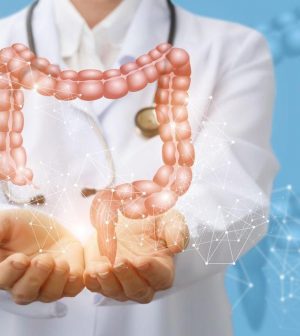- 10 Strategies to Overcome Insomnia
- Could Artificial Sweeteners Be Aging the Brain Faster?
- Techniques for Soothing Your Nervous System
- Does the Water in Your House Smell Funny? Here’s Why
- Can a Daily Dose of Apple Cider Vinegar Actually Aid Weight Loss?
- 6 Health Beverages That Can Actually Spike Your Blood Sugar
- Treatment Options for Social Anxiety Disorder
- Understanding the Connection Between Anxiety and Depression
- How Daily Prunes Can Influence Cholesterol and Inflammation
- When to Take B12 for Better Absorption and Energy
Having Even a Cousin or Grandparent With Colon Cancer Raises Your Risk: Study

Colon cancer risk runs in families, and it’s not just a parent or sibling having had the disease that should concern you.
If you have a second- or third-degree relative who had colon cancer at an early age, your odds of having the disease substantially increase, a new study finds.
First-degree relatives include parents, children and siblings. Second-degree relatives include aunts, uncles, grandparents, grandchildren, nieces and nephews. Third-degree relatives include first cousins, great-grandparents and great-grandchildren.
“Our study provides new insight into the magnitude of risk for more distant relatives of colorectal cancer cases, and in particular, for relatives of cases who were diagnosed before age 50,” said researcher Heather Ochs-Balcom, an associate professor of epidemiology and environmental health with the University at Buffalo (N.Y.) School of Public Health and Health Professions.
“This work is important given the rising rates of early-onset colorectal cancer,” she said in a university news release. The researchers, from the University at Buffalo and the University of Utah, referred to early-onset colon cancer as cases diagnosed before age 50.
First-degree relatives of someone diagnosed with early-onset colon cancer are six times more likely to develop colon cancer before age 50; second-degree relatives are three times more likely, and third-degree relatives are about 1.5 times more likely, investigators found.
For the study, they reviewed more than 1,500 early-onset colon cancer cases in the Utah Cancer Registry.
Researchers also found that people have a 2.6-fold higher risk of colon cancer at any age if they have a first-degree relative with early-onset colon cancer. And the risk is about two times greater for second-degree relatives, and 1.3 times greater for third-degree relatives.
These findings suggest that a colonoscopy screening before age 50 may be beneficial for second-degree relatives and possibly third-degree relatives of someone who developed colon cancer, not just immediate family members.
The report was published in August in the journal Cancer Epidemiology.
More information
For more on colon cancer, see the American Cancer Society.
SOURCE: University at Buffalo, news release, Sept. 13, 2021
Source: HealthDay
Copyright © 2026 HealthDay. All rights reserved.










